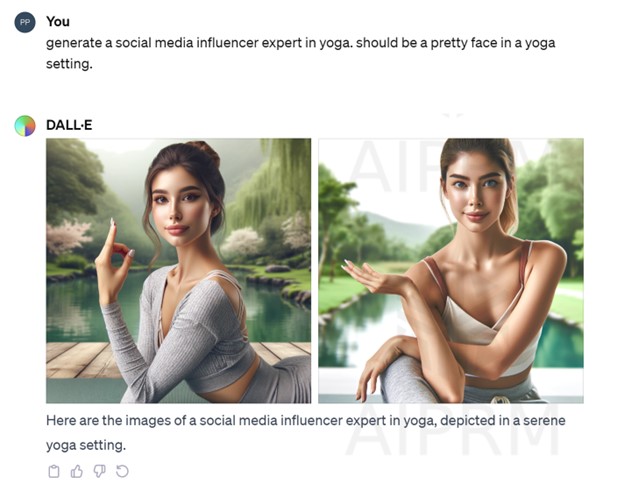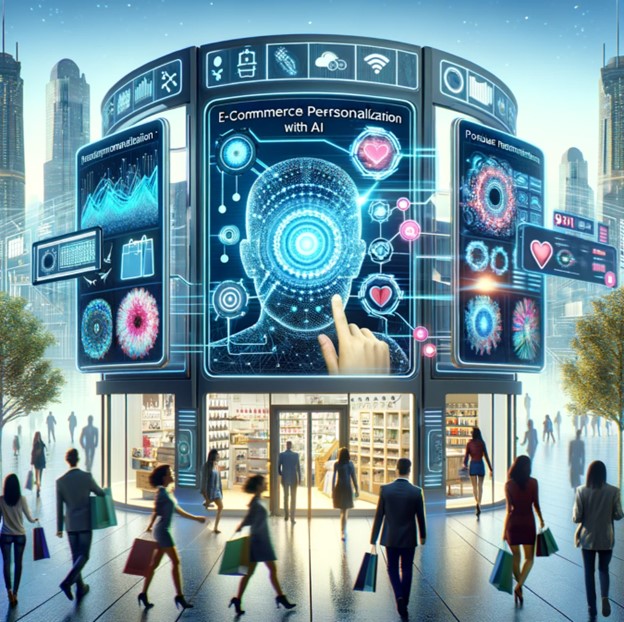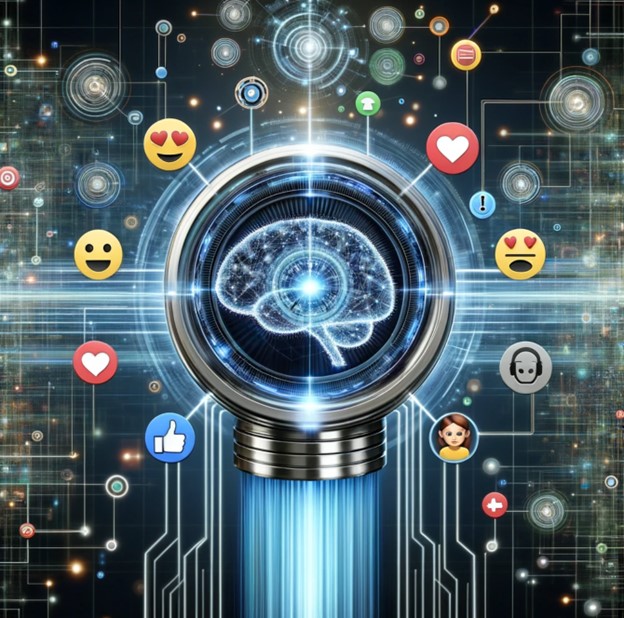20 min to read
This is an article that I have been reluctant to write for a long time. Although we started with AI 5 years ago, its moving pace is so fast that I feel that I will always be late. Let me start by telling you a story about my daughter, a 9-year-old girl that I introduced to Chat GTP. The entry-level was pretty simple: "Here is where you ask", "and here is where it replies". 15 min after I came back and she was talking to ChatGPT asking it to write funny stories that involved a lot of personal stuff (names, pets, places she loves). She had an editorial overview without the time to process and write a text. The explosion is about to happen.
If you're a digital marketer, navigating the ever-changing world of online advertising, the change will be spectactular. In the world of digital marketing, artificial intelligence is not just a buzzword — it's a game changer. If you're ready to revolutionize your strategies and stay ahead of the curve, read on to discover why AI holds the key to the future of your industry.
CodeDesign is a leading digital marketing agency ranked #1 in Lisbon, Portugal. You could work with us to accelerate your business growth.
Content Creation
Artificial intelligence is transforming the face of content creation in digital marketing. AI-powered tools can analyze vast amounts of data, spotting trends and identifying audience preferences more quickly and accurately than ever before. This data-driven insight allows marketers to create highly personalized content that resonates with audiences on a deeper, more meaningful level.
Furthermore, AI can generate content, from email subject lines to social media posts, freeing up time for marketers to focus on strategy and creativity. This can be a huge help when you want to create tutorial videos because AI can edit videos by itself. For instance, it can select the best clips and engagingly arrange them.
Predictive analytics powered by AI can also forecast content performance, enabling marketers to refine and optimize their content strategies proactively. In addition, AI tools can automate tedious aspects of content creation, such as SEO optimization.
Altogether, AI is not just aiding but supercharging content creation in digital marketing, offering efficiency, personalization, and predictive capabilities beyond the reach of traditional methods.
Research
Artificial Intelligence is revolutionizing marketing research by introducing unprecedented levels of precision and efficiency. AI-powered algorithms can sift through vast quantities of data, extracting valuable insights about consumer behavior, purchasing patterns, and market trends more rapidly and accurately than traditional methods. These insights enable marketers to better understand their audience and tailor their strategies accordingly.
AI is also instrumental in predictive analytics, forecasting future market trends and consumer behavior to allow businesses to proactively adapt their strategies. Furthermore, the automation provided by AI reduces the time and effort spent on data collection and analysis, allowing marketers to focus on strategy and decision-making. Therefore, AI plays an instrumental role in enhancing the speed, precision, and effectiveness of marketing research.
Data Analysis and Insights
When you're devising a marketing campaign, you need to gather a lot of different data to analyze before kicking off. However, this can be time-consuming, which is why businesses use AI to speed up the process. Here are the pieces this can help with:
- Demographic data
- Psychographic data
- Behavioral data
- Purchase history
- Customer journey data
- Website analytics
- Social media metrics
- Email marketing metrics
- SEO
- Ad campaign performance
- Customer feedback and reviews
- Competitor analysis
- Market trends and industry reports
- Mobile app analytics
- Customer service and support data
It uses advanced algorithms to swiftly parse through massive datasets, uncovering hidden trends and patterns that might be overlooked by traditional analytical methods. This capability aids marketers in gaining a deeper understanding of customer behavior and preferences. Also, AI's predictive analytics provide valuable insights into future customer behavior and market trends, enabling proactive strategy adjustments.
Moreover, AI's automation power accelerates the typically time-consuming analysis process, granting marketers more time to concentrate on strategy formulation and decision-making. This transformation results in more targeted, personalized, and effective marketing campaigns.
A/B Testing
Artificial Intelligence is playing a pivotal role in enhancing A/B testing in the field of marketing. AI can automate the setup and analysis of these tests, helping to expedite the process and eliminate human error. Furthermore, by utilizing machine learning algorithms, AI can continually learn from each test's results, improving the accuracy and effectiveness of future tests.
With the capacity to analyze vast amounts of data from these tests, AI can swiftly identify subtle patterns and trends that the human eye might miss. This enables marketers to make data-driven decisions, optimize marketing strategies, and ultimately increase conversion rates. Thus, AI is not only streamlining A/B testing but also transforming it into a powerful tool for marketing optimization.
Content Optimization
AI can analyze user behavior and engagement with content through machine learning algorithms, identifying what resonates most with audiences. It can automatically tweak aspects such as headlines, images, and call-to-actions based on these insights, optimizing content for higher engagement and conversion rates.
Furthermore, AI can personalize content delivery based on individual user data, ensuring the right content reaches the right person at the right time. Thus, AI is enabling marketers to optimize their content more effectively and efficiently, leading to improved audience engagement and conversion rates.
Ad Targeting and Optimization
Leveraging AI, marketers can analyze vast volumes of data to identify key customer segments and their preferences, enabling precise targeting of ads. Advanced machine learning algorithms can also predict customer responses, optimize ad placement, and adjust bidding strategies in real time for maximum ROI.
Furthermore, AI can personalize ad content, ensuring the right message reaches the right person, and thereby enhancing user engagement. Additionally, AI's advanced analytics provide deep insights into ad performance, empowering marketers to continually refine and improve their strategies. Thus, AI offers an unprecedented level of precision, personalization, and efficiency in ad targeting and optimization.
Marketing Automation
Artificial Intelligence is revolutionizing marketing automation by enabling more efficient and personalized communication with customers. It helps in automating repetitive tasks such as email marketing, social media posting, and ad campaigns, saving marketers valuable time. Moreover, it empowers businesses to deliver personalized messages to customers based on their behavior and preferences.
AI's machine learning algorithms can analyze customer patterns and predict future behavior, enabling proactive customer engagement strategies. For instance, AI can trigger personalized emails or push notifications based on a customer's interaction with a brand, thus driving engagement and conversions. Furthermore, AI's predictive capabilities can optimize marketing efforts by anticipating the best time to engage with customers, enhancing the effectiveness of marketing campaigns.

So, there you have it. Whether you're analyzing consumer behavior, automating mundane tasks, or personalizing ad content, AI is the secret weapon you need to stay ahead in digital marketing. Embrace AI's capabilities to revolutionize your strategies and improve your marketing outcomes. It's time to leverage this game changer and unlock the untapped potential in your industry. Remember, the future of digital marketing is here, and it's powered by AI.
Voice Search Optimization and Marketing
In the rapidly evolving landscape of digital marketing, voice search optimization (VSO) has emerged as a critical area for businesses looking to stay ahead. With the increasing popularity of voice-activated devices like Amazon Echo, Google Home, and smartphones with voice assistants, optimizing for voice search is no longer just an option but a necessity. This article delves into the strategies for voice search optimization and provides practical use cases to illustrate its significance.
Voice search differs significantly from traditional text-based queries. Voice queries are typically longer, more conversational, and often posed in the form of questions. This shift necessitates a new approach to SEO. For instance, a text search might be “weather New York,” while a voice search would be “What is the weather like in New York today?”
Strategies for Voice Search Optimization
- Long-tail Keywords and Natural Language: To optimize for voice search, focus on long-tail keywords and phrases that mirror natural speech. For example, a restaurant could optimize for “What are the best vegan restaurants near me?” rather than just “vegan restaurants.”
- Local SEO: Voice searches are often location-based. Businesses should ensure their local SEO is robust, with updated Google My Business listings and local keywords. A local bakery, for instance, can optimize for “best birthday cake near me” to capture nearby voice searches.
-
Structured Data and Schema Markup: Implementing schema markup on your website can help search engines understand and categorize content, making it more likely to be used in voice search answers. For example, a movie theater using schema markup can have its showtimes readily available for voice search queries.
-
Mobile Optimization: With many voice searches happening on mobile devices, a mobile-friendly website is crucial. This means fast loading times, responsive design, and easy navigation.
-
FAQ Pages and Conversational Content: Creating FAQ pages that answer common questions directly can boost VSO. A financial advisor’s website might include a page with questions like “How do I start investing in stocks?”
Examples
-
Retail: In retail, voice search can enhance the shopping experience. For instance, Walmart integrated voice shopping capabilities with Google Assistant, allowing customers to shop using voice commands from their homes.
-
Healthcare: Healthcare providers can optimize for voice search to provide better accessibility. For example, a dental clinic could optimize for voice searches like “emergency dentist open now” to reach patients in urgent need.
-
Hospitality: Hotels and resorts can use VSO to attract travelers. For instance, a hotel in Paris could optimize for “best hotel in Paris for families” to appear in voice searches by traveling families.
Voice Search and AI-Driven Marketing As AI continues to advance, its integration with voice search optimization is becoming more sophisticated. AI algorithms can analyze voice search patterns and preferences, enabling marketers to tailor their VSO strategies more effectively. This personalization leads to a more engaging user experience and higher conversion rates.
Codedesign’s Approach to Voice Search Optimization At Codedesign – a digital marketing agency – we understand the nuances of voice search optimization. We employ a data-driven approach, combining SEO best practices with a deep understanding of how voice search is transforming user behavior. Our strategies are tailored to ensure that businesses not only appear in voice search results but also provide the value that users are seeking.

Revolutionizing Customer Service: The Role of Chatbots in Modern Business
In an era where instant communication is paramount, chatbots have become an indispensable tool for enhancing customer service. By employing artificial intelligence (AI) and natural language processing (NLP), chatbots are able to interact with customers in a human-like manner, providing swift and efficient responses to inquiries. This article explores how chatbots are transforming customer service, supported by real-world examples and use cases.
Chatbots are not just a trendy technology; they represent a fundamental shift in how businesses interact with their customers. They offer 24/7 availability, immediate response to customer queries, and the ability to handle multiple customers simultaneously, which is crucial in today’s fast-paced business environment.
Strategies for Implementing Chatbots
- Automating Routine Inquiries: Chatbots excel at handling routine questions, such as FAQs. This allows human agents to focus on more complex customer issues. For example, a bank might use a chatbot to answer common queries about account balances or branch hours.
- Personalization and Recommendation: Advanced chatbots can offer personalized suggestions based on customer interaction history. An online retailer could use a chatbot to recommend products based on past purchases.
- Seamless Integration with Customer Support: Integrating chatbots with existing customer support platforms ensures a cohesive experience. For instance, a chatbot on an airline’s website can initially handle a query and then seamlessly transfer the customer to a human agent if needed.
- Feedback Collection and Analysis: Chatbots can also be used to gather customer feedback, which can be analyzed to improve products and services. A restaurant chain might use a chatbot to collect customer opinions post-visit.
Use Cases
-
E-commerce: E-commerce giant Amazon utilizes chatbots to assist customers with order tracking, returns, and recommendations, streamlining the shopping experience.
-
Banking: Bank of America’s chatbot “Erica” provides financial insights, bill reminders, and support for banking queries, enhancing customer financial management.
-
Healthcare: Health service providers are using chatbots for appointment scheduling, medication reminders, and providing health advice, as seen with the NHS’s chatbot in the UK.
-
Travel and Hospitality: Airlines like KLM use chatbots for booking flights, providing flight updates, and handling customer queries, improving the travel experience.
Chatbots and Advanced Customer Service Technologies
The future of chatbots in customer service is closely tied to advancements in AI and machine learning. These technologies enable chatbots to understand and respond to more complex queries, predict customer needs, and provide more personalized and proactive service.
Codedesign’s Integration of Chatbots in Digital Strategies
At Codedesign, we recognize the transformative impact of chatbots on customer service. We integrate chatbots into digital strategies to enhance customer engagement, improve response times, and provide personalized experiences. Our approach is to align chatbot functionalities with business goals, ensuring that they add real value to both the business and its customers.

Navigating the Future of Influencer Marketing with AI: Strategies, Examples, and Insights
Influencer marketing has become a cornerstone in modern brand strategies, offering a human touch in a digital world. The integration of Artificial Intelligence (AI) in this realm is revolutionizing how brands discover and collaborate with influencers, offering enhanced efficiency and effectiveness. This article explores the intersection of AI and influencer marketing, illustrating its impact through real-world examples and use cases. The rise of AI in influencer marketing represents a significant shift from traditional, often intuitive approaches. AI algorithms can analyze vast amounts of data – from engagement rates to audience demographics – enabling brands to identify influencers whose followers align most closely with their target audience.
AI-Driven Strategies in Influencer Marketing
-
Data-Driven Influencer Identification: AI helps brands identify influencers based on specific criteria like reach, engagement, audience demographics, and content style. For example, a beauty brand can use AI to find influencers with a high percentage of female followers interested in skincare.
-
Predictive Performance Analytics: AI can forecast the potential impact of an influencer collaboration, aiding in more informed decision-making. A fitness apparel brand could use predictive analytics to estimate the ROI of partnering with a particular fitness influencer.
-
Enhanced Content Optimization: AI tools analyze which content types perform best, helping influencers create more impactful posts. An eco-friendly brand might use AI insights to guide its influencers on which content themes resonate most with their audience.
-
Automated Campaign Management: AI streamlines campaign management by automating tasks like tracking, reporting, and analyzing campaign performance. This allows for real-time adjustments for optimal effectiveness.
Examples
-
Fashion and Beauty: L’Oréal utilizes AI to match their products with suitable influencers, ensuring their campaigns reach the most relevant audiences.
-
Technology and Gadgets: Samsung collaborates with tech influencers using AI insights to target tech-savvy consumers effectively, enhancing product launch campaigns.
-
Food and Beverage: Coca-Cola has leveraged AI in influencer marketing to analyze consumer sentiments and trends, guiding their collaborations for maximum engagement.
-
Travel and Hospitality: Airbnb uses AI to identify travel influencers whose followers show high engagement in travel content, optimizing their marketing efforts.
Codedesign’s Approach to AI in Influencer Marketing
At Codedesign, we harness the power of AI to enhance influencer marketing strategies for our clients. Our approach involves using AI for precise influencer matching, performance prediction, and campaign optimization, ensuring that each campaign delivers measurable results and aligns with the brand’s objectives. The integration of AI into influencer marketing marks a new era of precision and efficiency in digital marketing. As AI continues to evolve, its role in influencer marketing will only grow, offering brands unprecedented opportunities to connect with their audience through the most influential voices in their industries.
Privacy and Ethical Considerations in AI-Driven Marketing
As Artificial Intelligence (AI) continues to redefine the marketing landscape, it brings with it a complex array of privacy and ethical considerations. The ability of AI to analyze vast amounts of data for targeted marketing strategies raises crucial questions about consumer rights and ethical practices. This article examines the privacy and ethical challenges in AI marketing and outlines strategies for businesses to address these issues responsibly.
Privacy concerns in AI marketing primarily revolve around the collection, use, and storage of consumer data. AI systems require substantial data to function effectively, but this often includes sensitive personal information. The key challenge for marketers is balancing the benefits of AI-driven personalization with the need to protect consumer privacy. Ethical considerations in AI marketing extend beyond data privacy. They encompass issues such as transparency in AI-driven decisions, avoiding biases in AI algorithms, and ensuring that AI marketing practices do not manipulate or unfairly influence consumers.
Strategies for Addressing Privacy and Ethics in AI Marketing
-
Data Privacy and Protection: Implement robust data privacy policies, ensuring compliance with regulations like GDPR and CCPA. For instance, a retail company using AI for personalized recommendations must ensure customer data is securely stored and used in compliance with these laws.
-
Transparency and Consent: Be transparent with customers about how their data is being used. Obtain explicit consent for data collection and use. A financial services firm could include clear, understandable consent forms on its website when collecting user data for AI-driven services.
-
Bias Mitigation: Regularly audit AI algorithms for biases and take steps to eliminate them. This is crucial in sectors like hiring or lending, where biased AI could lead to unfair practices.
3 Examples
-
E-commerce and Retail: Amazon uses AI for personalized recommendations but faces challenges in ensuring consumer data privacy. Their approach to data encryption and user consent is a key study in balancing personalization with privacy.
-
Social Media Marketing: Facebook's use of AI in ad targeting has raised ethical questions, particularly around transparency and bias. Their ongoing efforts to address these concerns highlight the complexities of ethical AI marketing.
-
Financial Services: Banks using AI for personalized services must navigate stringent financial privacy laws, making them a relevant example of ethical AI marketing in a highly regulated industry.
Codedesign’s Approach to Ethical AI Marketing
At Codedesign, we understand the importance of ethical considerations in AI-driven marketing. Our approach involves not only complying with privacy laws but also upholding high ethical standards in our AI marketing solutions. We prioritize transparency, consent, and bias mitigation to ensure our marketing practices respect consumer rights and promote trust.

Enhancing E-Commerce Personalization with AI: Strategies, Examples, and Future Trends
In the dynamic world of e-commerce, personalization has become a key differentiator for businesses seeking to enhance customer experience and increase conversions. The integration of Artificial Intelligence (AI) into e-commerce platforms is revolutionizing the way businesses personalize shopping experiences for their customers. This article delves into the impact of AI on e-commerce personalization, supported by real-world examples and practical use cases.
The Role of AI in E-commerce Personalization
AI in e-commerce personalization involves using machine learning algorithms and data analytics to provide tailored shopping experiences to individual customers. This can range from personalized product recommendations to customized marketing messages, all aimed at improving the customer journey.
Strategies for AI-Driven E-commerce Personalization
-
Personalized Product Recommendations: AI algorithms analyze customer behavior, past purchases, and browsing history to suggest relevant products. Amazon’s recommendation engine is a prime example, where customers are shown products related to their interests, increasing the likelihood of purchase.
-
Customized Search Results: AI can tailor search results based on a user’s past interactions, making the search process more efficient. For instance, an online fashion retailer could use AI to show search results that align with a customer's style preferences.
-
Dynamic Pricing: AI enables dynamic pricing strategies, where prices are adjusted in real-time based on demand, customer behavior, and market factors. Uber’s surge pricing model, although not a traditional e-commerce example, illustrates the concept of AI-driven dynamic pricing.
-
Automated Customer Service: Chatbots and virtual assistants, powered by AI, provide instant customer service, handling queries and guiding customers through their shopping journey. Sephora’s chatbot, which offers beauty advice and product recommendations, exemplifies this.
-
Targeted Marketing Campaigns: AI helps create personalized marketing campaigns by analyzing customer data to identify the most effective messaging and timing. Netflix’s use of AI to personalize email marketing campaigns based on viewing habits is a case in point.
Use Cases and Examples
-
Fashion Retail: ASOS uses AI to offer size recommendations, reducing returns and improving customer satisfaction.
-
Home Goods: IKEA’s AI-driven app allows customers to visualize furniture in their home before purchasing, enhancing the buying experience.
-
Grocery E-commerce: Walmart’s AI initiatives in online grocery shopping provide personalized product suggestions based on past purchases and shopping habits.
The Future of AI in E-commerce Personalization
The future of AI in e-commerce personalization is poised for continued growth, with advancements in AI technology enabling even more sophisticated personalization capabilities. This includes the use of AI for predictive analytics, anticipating customer needs before they even express them, and further refining the personalization of the entire customer journey.
Codedesign’s Expertise in AI-Driven E-commerce Personalization
At Codedesign, we specialize in integrating AI solutions into e-commerce platforms to create personalized customer experiences. Our approach involves leveraging AI for data-driven insights, ensuring that each customer interaction is tailored and relevant, thereby driving engagement and conversions.

Brand Sentiment Analysis
Brand sentiment analysis, enhanced by Artificial Intelligence (AI), offers a sophisticated approach to gauging and interpreting public sentiment across various digital platforms. This article explores the role of AI in brand sentiment analysis, illustrating its impact through real-world examples and practical use cases. Sentiment analysis involves evaluating the emotions and opinions expressed about a brand in online conversations and content. AI, particularly machine learning and natural language processing, enables businesses to analyze large volumes of data from social media, reviews, forums, and other digital platforms to gain insights into public sentiment.
AI-Driven Techniques in Brand Sentiment Analysis
-
Natural Language Processing (NLP): AI uses NLP to understand and interpret human language, categorizing comments as positive, negative, or neutral. This technique allows brands to process and analyze customer feedback at scale.
-
Predictive Analytics: AI can predict future brand sentiment trends based on historical data, helping businesses proactively manage their brand reputation.
-
Real-time Monitoring: AI enables continuous monitoring of brand sentiment, allowing businesses to respond quickly to changes in public perception.
-
Integration with Marketing Strategies: Insights gained from AI-driven sentiment analysis can inform broader marketing and communication strategies, ensuring they resonate with the target audience.
Use Cases and Examples
-
Consumer Electronics: Samsung uses AI sentiment analysis to monitor customer opinions on social media, which informs product development and marketing strategies.
-
Automotive Industry: Tesla, known for its active social media presence, leverages AI to track and respond to customer sentiments, influencing brand perception and customer service practices.
-
Hospitality and Travel: Airbnb utilizes AI to analyze reviews and social media chatter, helping to identify areas for improvement in their service and customer experience.
-
Retail: Amazon employs AI for sentiment analysis to understand customer feedback on products, influencing everything from product listings to customer service protocols.
Codedesign’s Approach to AI-Driven Brand Sentiment Analysis
At Codedesign, we recognize the power of AI in uncovering valuable insights from brand sentiment analysis. Our approach involves using advanced AI tools to provide real-time sentiment analysis, helping our clients make informed decisions to enhance their brand strategy and reputation.

Shaping the Future: AI's Transformative Role in Programmatic Advertising
The advent of Artificial Intelligence (AI) in programmatic advertising is reshaping how brands engage with audiences. This technology brings unprecedented levels of efficiency, targeting precision, and campaign optimization. In this article, we explore how AI is shaping the future of programmatic advertising, highlighting key trends, use cases, and the strategic role it plays in digital marketing. Programmatic advertising, the automated buying and selling of online advertising, has been revolutionized by AI. AI enhances this process by analyzing vast amounts of data, making real-time bidding more efficient, and providing insights for better ad targeting and optimization.
Key Trends in AI-Driven Programmatic Advertising
- Predictive Analytics for Targeting: AI's predictive capabilities enable advertisers to analyze consumer behavior patterns, predict future trends, and target ads more effectively. For example, an online retailer could use AI to predict which products a customer is likely to be interested in based on their browsing history.
- Real-time Bidding Optimization: AI algorithms can make instant decisions on which ad spaces to buy and how much to bid, based on the likelihood of ad success. This ensures optimal use of the advertising budget.
- Dynamic Creative Optimization (DCO): AI enables the automatic customization of creative elements in ads (like images and messages) based on user data, enhancing personalization and relevance.
- Enhanced ROI Measurement and Attribution: AI tools provide more sophisticated ways to measure ad performance and ROI, helping advertisers understand the true value of their campaigns.
Use Cases and Examples
-
Retail and E-commerce: Brands like Amazon leverage AI in programmatic advertising to deliver personalized ads based on user search history, purchase behavior, and browsing patterns.
-
Automotive Industry: Car manufacturers use AI to target potential buyers based on factors like recent car searches, visits to automotive sites, and consumer lifestyle data.
-
Travel and Tourism: Companies like Expedia utilize AI to serve personalized travel deals and ads to users who have shown interest in specific destinations or types of travel.
-
Entertainment and Media: Streaming services like Netflix use AI to advertise new shows and movies based on individual viewing habits and preferences.
Codedesign's Vision for AI in Programmatic Advertising
At Codedesign, we recognize the transformative potential of AI in programmatic advertising. Our approach involves leveraging AI to not only enhance ad targeting and efficiency but also to ensure that ethical considerations and data privacy are at the forefront of our strategies.
As we delve into the complex and simple ways in which Artificial Intelligence is reshaping the digital marketing landscape, from voice search optimization to AI-driven programmatic advertising, it's clear that the future of marketing is intertwined with technological advancement. AI's ability to enhance customer experiences, provide deep insights through data analysis, and revolutionize advertising efficiency presents unprecedented opportunities for businesses. The key to leveraging these advancements lies in understanding and integrating AI strategically, ensuring it aligns with business goals and addresses customer needs effectively.
At Codedesign.org, we are at the forefront of harnessing AI's potential in digital marketing. Our commitment to integrating AI with ethical considerations, data-driven strategies, and innovative solutions positions us as a leader in this rapidly evolving field. As AI continues to transform the digital landscape, we are dedicated to helping businesses navigate these changes, ensuring they stay ahead in a competitive and ever-changing market.
FAQs - Frequently Asked Questions
How is AI transforming content creation in digital marketing?
AI is revolutionizing content creation in digital marketing by enabling personalized content generation, enhancing creativity, and significantly improving efficiency. Tools powered by AI algorithms analyze vast datasets to understand audience preferences, behaviors, and trends, allowing marketers to craft content that resonates deeply with their target demographic. For instance, AI can generate articles, social media posts, and even video scripts tailored to specific audiences, saving time and resources while ensuring relevance and engagement. Moreover, AI-driven content creation tools can optimize headlines and content for SEO, increasing visibility and traffic. Codedesign, for example, has leveraged AI to automate and optimize content creation for clients, leading to increased engagement rates and improved SEO performance, demonstrating a tangible impact on digital marketing strategies.
What role does AI play in marketing research and data analysis?
In marketing research and data analysis, AI plays a pivotal role in extracting actionable insights from complex datasets. By employing machine learning algorithms and natural language processing, AI can sift through large volumes of data, identifying patterns, trends, and consumer sentiments that might not be visible to the human eye. This capability enables marketers to make data-driven decisions, fine-tune target audience segmentation, and predict market movements with higher accuracy. For Codedesign's clients, AI-driven data analysis has facilitated a deeper understanding of consumer behavior, optimized marketing spend by identifying the most effective channels, and enhanced competitive analysis, thereby ensuring that marketing strategies are both efficient and effective.
How does AI enhance the efficiency and effectiveness of A/B testing in marketing?
AI enhances the efficiency and effectiveness of A/B testing in marketing by automating the testing process and enabling the analysis of results in real-time. Traditional A/B testing can be time-consuming and often requires significant manual effort to design, implement, and interpret. AI, however, can rapidly test multiple variables simultaneously, identify the best-performing content, design, or messaging, and apply these insights to optimize future campaigns. This not only accelerates the testing cycle but also improves the precision of the outcomes, leading to higher conversion rates and better ROI. For Codedesign's clients, AI-powered A/B testing has resulted in more effective campaigns by rapidly identifying and scaling successful elements, thereby maximizing marketing investments.
In what ways can AI optimize content for better engagement and conversion rates?
AI can optimize content for better engagement and conversion rates by personalizing content delivery, optimizing for search engines, and predicting content performance. Through advanced analytics and machine learning, AI tools can tailor content recommendations and presentations to individual users based on their previous interactions, demographic information, and preferences, thereby enhancing user engagement. AI algorithms also optimize content for SEO by suggesting keywords, meta tags, and content structures that are more likely to rank higher in search engine results. Additionally, predictive analytics can forecast the potential success of different content types, allowing marketers to focus on creating content with the highest conversion potential. Codedesign has effectively used AI to refine content strategies for clients, leading to notable improvements in engagement metrics and conversion rates.
How does AI improve ad targeting and optimization for digital marketers?
AI improves ad targeting and optimization for digital marketers by leveraging data to make real-time decisions, personalize advertising to individual users, and predict the success of ad campaigns. Through machine learning algorithms, AI can analyze user behavior, preferences, and engagement patterns to serve highly targeted ads that are more likely to convert. AI also continuously optimizes campaigns by adjusting bids, testing creatives, and reallocating budgets towards the most effective channels and audience segments. This dynamic approach ensures optimal ad performance and ROI. Codedesign has utilized AI-driven ad targeting and optimization to achieve superior results for clients, demonstrating the power of AI in maximizing the impact of digital advertising efforts.
What advantages does marketing automation offer through the use of AI?
Marketing automation powered by AI offers several advantages, including increased operational efficiency, enhanced personalization, and improved decision-making. By automating repetitive tasks such as email marketing, social media posting, and ad campaign management, AI allows marketers to focus on strategic activities. AI-driven personalization engines can deliver highly relevant content and offers to individual users, significantly improving customer engagement and loyalty. Moreover, AI enables smarter decision-making by providing insights and predictions based on data analysis, helping marketers to allocate resources more effectively and anticipate market trends. For Codedesign's clients, AI-powered marketing automation has streamlined operations, tailored customer experiences, and optimized marketing strategies, yielding substantial business growth.
How is voice search optimization changing with AI, and why is it important?
Voice search optimization is evolving rapidly with AI, becoming crucial due to the growing prevalence of voice-activated devices and virtual assistants. AI improves voice search optimization by enhancing natural language processing capabilities, enabling search engines to better understand and process voice queries. This shift requires marketers to adapt their SEO strategies to focus on conversational keywords and question-based content that aligns with how people naturally speak. Optimizing for voice search is important because it increasingly influences how consumers find information online, making it essential for businesses to remain visible in voice search results. Codedesign has recognized this trend and integrates voice search optimization into digital strategies for clients, ensuring their brands maintain competitive visibility in this evolving landscape.
What are the benefits of using chatbots in customer service within digital marketing?
Using chatbots in customer service within digital marketing offers significant benefits, such as enhanced customer experience, 24/7 availability, and scalability. Chatbots, powered by AI, can handle a vast number of inquiries simultaneously, providing instant responses to common questions and freeing up human agents for more complex issues. This immediate interaction improves the customer experience by reducing wait times and ensuring support is always accessible. Furthermore, chatbots can be programmed to collect data from interactions, offering valuable insights into customer preferences and behaviors, which can inform marketing strategies. For Codedesign clients, implementing chatbots has led to improved customer satisfaction scores and increased efficiency in handling customer inquiries, demonstrating the strategic value of chatbots in digital marketing ecosystems.
How does AI contribute to the precision and efficiency of influencer marketing?
AI contributes to the precision and efficiency of influencer marketing by streamlining influencer discovery, improving match accuracy between brands and influencers, and measuring campaign impact more effectively. By analyzing vast amounts of data, AI can identify influencers whose audiences closely align with a brand's target demographic, optimizing campaign relevance and effectiveness. AI tools can also track engagement and conversion metrics in real-time, allowing for the fine-tuning of campaigns and a clear understanding of ROI. This data-driven approach ensures that influencer marketing efforts are not only more efficient but also more strategically aligned with business goals. Codedesign has leveraged AI to enhance influencer marketing campaigns for clients, achieving higher engagement rates and more impactful brand partnerships.
What are the ethical considerations marketers should be aware of when using AI in digital marketing?
When using AI in digital marketing, marketers should be mindful of ethical considerations such as data privacy, transparency, and bias. Ensuring the ethical use of AI involves respecting consumer privacy by safeguarding personal data and adhering to regulations like GDPR. Transparency about how AI is used in marketing practices is crucial to maintaining trust with consumers. Additionally, marketers must be vigilant about biases in AI algorithms, which can lead to unfair or discriminatory outcomes. Addressing these biases requires regular auditing of AI systems and a commitment to ethical AI practices. For Codedesign and its clients, adhering to these ethical standards is integral to building and maintaining trust with audiences, emphasizing the importance of ethical considerations in the deployment of AI within digital marketing strategies.

About Bruno GavinoBruno Gavino is the CEO and partner of Codedesign, a digital marketing agency with a strong international presence. Based in Lisbon, Portugal, with offices in Boston, Singapore, and Manchester (UK) Codedesign has been recognized as one of the top interactive agencies and eCommerce agencies. Awarded Top B2B Company in Europe and Top B2C company in retail, Codedesign aims to foster personal relationships with clients and create a positive work environment for its team. He emphasizes the need for digital agencies to focus on data optimization and performance to meet the increasingly results-driven demands of clients. His experience in digital marketing, combined with a unique background that includes engineering and data, contributes to his effective and multifaceted leadership style. |

About CodedesignCodedesign is a digital marketing agency with a strong multicultural and international presence, offering expert services in digital marketing. Our digital agency in Lisbon, Boston, and Manchester enables us to provide market-ready strategies that suit a wide range of clients across the globe (both B2B and B2C). We specialize in creating impactful online experiences, focusing on making your digital presence strong and efficient. Our approach is straightforward and effective, ensuring that every client receives a personalized service that truly meets their needs. Our digital agency is committed to using the latest data and technology to help your business stand out. Whether you're looking to increase your online visibility, connect better with your audience, get more leads, or grow your online sales. For more information, read our Digital Strategy Blog or to start your journey with us, please feel free to contact us. |
CodeDesign is leading:
- Digital Agency
- Digital Marketing Agency
- Digital Ecommerce Agency
- Amazon Marketing Agency


Add comment ×